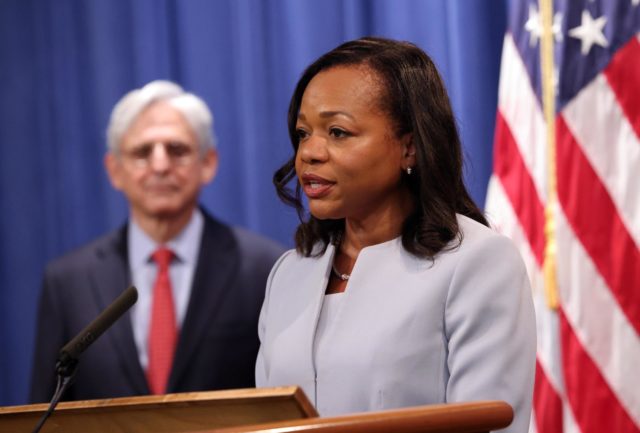
Tierney Sneed, CNN
(CNN) — The Justice Department’s Civil Rights Division has launched several major investigations under President Joe Biden, an aggressive start after years of neglect during the Trump-era.
In the early months of the administration, the department announced investigations into three major police departments — a 180-degree turn from the last administration, which was highly skeptical of such systemic reviews. The Biden Justice Department has also launched an investigation into Georgia’s prison system for alleged civil rights violations.
The most recent, publicly announced investigation was launched in Texas, where five juvenile detention facilities are being examined for systemic physical or sexual abuse of children.
Kristen Clarke, Biden’s civil rights chief, highlighted the racial disparities in juvenile detention systems.
“Nationally, Black children are over four times more likely to be incarcerated than White children,” Clarke said last Wednesday. “And the disparity is even greater in Texas, where Black children are over five times more likely to be incarcerated.”
The moves showcase the reorientation of priorities now that a Democratic administration — with several Justice Department leaders with deep backgrounds in civil rights — is in charge.
The boldest of these moves is, perhaps, a review of DOJ police funding that was announced last month. The review relies on a piece of civil rights law known as Title VI, that is often described as the sleeping giant of civil rights law, Bill Yeomans, a former acting assistant attorney general for civil rights told CNN.
“It can be incredibly powerful and it’s been underutilized,” said Yeomans, now a lecturer at Columbia Law School.
He and other former DOJ officials told CNN that, under past Democratic administrations, embracing the tool as leverage for civil rights compliance had been discussed but never executed. The review will evaluate how the department is meeting its obligations, under Title VI, to “ensure that public funds are not furthering race discrimination,” Associate Attorney General Vanita Gupta said last month during an event at the Texas Tribune Festival.
Gupta, who led the civil rights division under President Barack Obama, is now the No. 3 leader at the department, a role that gives her oversight of not just of the civil rights division, but other influential parts of the agency, including the civil division and the police grant-making process.
“The kind of vantage point that I have over the department is different and unique,” Gupta said at the Texas Tribune Festival.
“These are big, big shifts that we’re seeing,” Sherrilyn Ifill, the president of the NAACP Legal Defense and Educational Fund, told CNN. “I don’t think there’s ever been a Title VI comprehensive review by the Department of Justice.”
‘Able to hit the ground running’
Under President Donald Trump, leadership took a tough line in favor of police departments; then-Attorney General Jeff Sessions all but froze the type of systemic investigations into police departments — known as “pattern-or-practice” investigations — that have been reinvigorated under Attorney General Merrick Garland.
The Trump Justice Department also elevated religious freedom concerns, supporting legal challenges to Covid public health restrictions that states and localities imposed on churches, while the civil rights division did little on voting rights over the course of Trump’s presidency.
Beyond the typical shift in emphasis that comes in the Democratic administration, the Biden leadership team had expertise rooted in civil rights — Gupta is the first associate attorney general with a civil rights background — as well as deep previous experience at the department.
Clarke started her legal practice as a career attorney at the DOJ civil rights division she now leads. She also led the civil rights bureau at New York state attorney general office and later took the helm of the private legal group, Lawyers’ Committee for Civil Rights Under Law.
Biden’s selection of Gupta and Clarke — as well as Pamela Karlan, another civil rights attorney whose current position as principal deputy assistant attorney general of the division did not require Senate confirmation — signaled that racial justice and voting rights, among other civil rights issues, would be of top priority at the department.
Gupta and Clarke faced bruising confirmation battles, with Republicans mostly united against them.
Within the civil rights the community, the expectations for what the Biden leadership team could do were high, said Jon Greenbaum, senior deputy director for the Lawyers’ Committee.
“The whole idea of this team was, what you’re what you’re able to do is, you’re able to hit the ground running, probably in a way that’s been unprecedented, in terms of the people that are in these positions,” Greenbaum told CNN.
‘Taking care of unfinished business’
A week in mid-September encapsulated what this new leadership team would yield. In addition to the police grant review and the announcement of the Georgia prison investigation, the department unveiled a retooled approach to overseeing consent decree monitors, as well as new limits on chokeholds and no-knock warrants.
The prison investigation expands upon the efforts by previous administrations to probe potential civil rights violations in Georgia’s penitentiary system, as an investigation, launched when Gupta led Obama DOJ civil rights division, into the treatment of transgender prisoners in Georgia remains ongoing.
“It’s a really strong sign that Vanita is going to take care of unfinished business,” said Julie Abbate, a former DOJ official who is now the National Advocacy Director for Just Detention International, which focuses on ending sexual abuse in detention.
“Not just go back to the way things were, but make things even better than they were before, because the way things were under Obama, it was the floor if anything,” Abbate said.
The DOJ’s fresh look at its standards for consent decree monitors — i.e. the people who are tasked with ensuring police departments are complying with civil rights agreements they’ve reached with the department — came after Gupta held more than 50 stakeholder meetings
The department is seeking to bring more transparency into the fees monitors are paid, as well as more oversight around the speed with which departments are being brought into compliance.
“We want to incentivize constitutional policing, and compliance as quickly as possible,” Gupta said at the Texas Tribune Festival, explaining the move. “This is about making sure our communities can be safe and people’s civil rights are protected.”
‘To think that they’re done… no way’
Even with the new developments, civil rights advocates said that some of the moves — like the new DOJ policy banning the use of chokeholds unless lethal force is authorized– should only be the start of a broader approach.
Noting that courts have already deemed chokeholds a use of lethal force, Jonathan Smith, the executive director of the Washington Lawyers’ Committee for Civil Rights and Urban Affairs, said the DOJ’s new policy was “not a major step forward.”
“It is critically important to articulate in policy that chokeholds should not be used,” Smith said. “But it really was not a dramatic move or innovation.”
The announcement of the policy raised questions, among prisoners’ rights advocates, about the lack of transparency around the practices of the US Bureau of Prisons. Federal prisons house a relatively small segment of the US prison population, but still set the tone for the US government’s ability to influence state and local penitentiary systems.
“That would be a good thing for Vanita and Kristen Clarke, and the attorney general to do, is to create transparency in the policies that the BOP is following, and how exactly are you banning these types of practices,” Abbate said.
“They’ve addressed like the 1% of the issue and to think that they’re done, with that especially with the BOP, no way,” she added.
CORRECTION: An earlier version of this story incorrectly referred to a title of civil rights law. The correct version is Title VI.
The-CNN-Wire
™ & © 2021 Cable News Network, Inc., a WarnerMedia Company. All rights reserved.



























